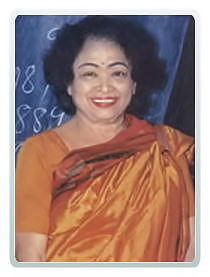Vegetarian Era
Vegetarian Era The Stories of Two Vegetarian Geniuses
The vegetarian diet is highly nutritious, healthful and beneficial to adults and children alike, helping them develop higher intelligence, greater compassion and deeper spiritual awareness. Below are the stories of two of the world’s most intelligent people, both of whom are vegetarians.
 Shakuntala Devi, born November 4, 1939 in Bangalore, India, is an Indian mathematician often referred to as a “human calculator” and “the smartest woman in the world.” She has been tested at universities around the globe, her most famous demonstration involving the multiplication of two random thirteen-digit numbers in twenty-eight seconds. This feat earned Ms. Devi a place in the Guinness Book of World Records although the record was later removed “on the grounds that her achievements are so vastly superior to the calculating feats of any other investigated prodigy that the authentication must have been defective.” The calculation was carried out before mathematics professors at a major U.S. university, who dismiss the doubts of the Guinness publishers but agree that the achievement was truly incredible. Ms. Devi has also broken countless other calculating records and is thought to be the reincarnation of Srinivasa Ramanujan (1887–1920), one of the greatest mathematical geniuses of all time and also a vegetarian. She thus explains the secret of her abilities:
Shakuntala Devi, born November 4, 1939 in Bangalore, India, is an Indian mathematician often referred to as a “human calculator” and “the smartest woman in the world.” She has been tested at universities around the globe, her most famous demonstration involving the multiplication of two random thirteen-digit numbers in twenty-eight seconds. This feat earned Ms. Devi a place in the Guinness Book of World Records although the record was later removed “on the grounds that her achievements are so vastly superior to the calculating feats of any other investigated prodigy that the authentication must have been defective.” The calculation was carried out before mathematics professors at a major U.S. university, who dismiss the doubts of the Guinness publishers but agree that the achievement was truly incredible. Ms. Devi has also broken countless other calculating records and is thought to be the reincarnation of Srinivasa Ramanujan (1887–1920), one of the greatest mathematical geniuses of all time and also a vegetarian. She thus explains the secret of her abilities:
The answer just flashes into my mind. For a difficult demonstration with large numbers, I prepare for two or three days. I rest myself; just rest my mind completely. I set aside personal problems and don’t even think about them, which is good therapy for me, too. When I go on the stage, all I think of is how to give the right answers to the problems. Yes, I’m in the Guinness Book of World Records. It’s all God’s grace. I take no credit to myself whatsoever. I can perform for one and a half to two hours. Once I get started, you can’t stop me. But to do it again I need to prepare for two or three days.
Ms. Devi has traveled around India and Africa inspiring children to study mathematics. Recently, she has been working to establish math institutes in India to promote her nation’s proud legacy in the field, and has written several popular books on teaching mathematics, as well as a crime novel. Regarding current educational methods she says, “Most schools today are teaching computers and software, but one thing they miss is giving a spiritual backup to the children. I want that to be taken care of as well because one without the other is no good.”
Ms. Devi is also a lifelong vegetarian and has even written a vegetarian cookbook for men. An interesting story regarding her vegetarian diet goes as follows. When she first visited the United States, she frequently ate pancakes and maple syrup as little other vegetarian food was available at the time. The American pancakes reminded her of a typical South Indian breakfast dish called dosai (fermented lentil crepes). During that period, she was the subject of a scientific study by Dr. Arthur Jensen, a researcher on human intelligence at the University of California at Berkeley. Jensen described her regular pancake consumption in a scientific paper, citing it as possible evidence of a mental disorder. The paper was then used as a reference for the Oscar-winning film Rainman (1988). In the movie, Dustin Hoffman plays a genius with mathematical abilities similar to those of Ms. Devi but who is socially inept—and obsessed with pancakes! Devi laughs at this typical non-vegetarian misconception. In fact, Jensen’s thesis was that Devi was an exceptionally well-rounded individual and math genius as well as a compassionate, inspiring role model.
 Gregory Smith is a famous child prodigy from the U.S. who graduated from college at the age of thirteen with numerous honors and is now pursuing four doctorates at the University of Virginia. At age nine, he founded International Youth Advocates, an organization promoting peace and nonviolence, and has since been nominated four times for the Nobel Peace Prize, has met with presidents (including U.S. President Bill Clinton), Nobel Peace Laureates and other leaders, has appeared before the UN Security Council and was a CCF delegate to the UN Special Session on the Rights of the Child. Some of Gregory’s proudest achievements include developing Peace Schools in war-torn Kenya and the first public library in Rwanda. He is now sixteen years old.
Gregory Smith is a famous child prodigy from the U.S. who graduated from college at the age of thirteen with numerous honors and is now pursuing four doctorates at the University of Virginia. At age nine, he founded International Youth Advocates, an organization promoting peace and nonviolence, and has since been nominated four times for the Nobel Peace Prize, has met with presidents (including U.S. President Bill Clinton), Nobel Peace Laureates and other leaders, has appeared before the UN Security Council and was a CCF delegate to the UN Special Session on the Rights of the Child. Some of Gregory’s proudest achievements include developing Peace Schools in war-torn Kenya and the first public library in Rwanda. He is now sixteen years old.
When Gregory was two, although he lived in a meat-eating household, he made a conscious resolution to pursue a vegetarian diet and later persuaded his parents to follow his example. In explaining his decision to become a vegetarian he states:
There are many reasons for my choice to be a vegetarian. Most importantly, it is a healthy life choice for me. If the world would become vegetarian, or at least limit animal consumption to twice a month, we would be able to feed the world and eliminate starvation and illnesses related to malnutrition. Studies have proven that nutrition and health are vital elements in a successful educational process. Education and a compassionate understanding of our world are essential for peace.
Being a ten-year-old college freshman attracted international media attention. That helped to establish a platform for my life’s mission to protect the lives of the world’s children. Mathematical research, biomedical applications and international political initiatives are all part of my ultimate plans. The academic foundation I am building will interconnect throughout my future as I aspire to make lasting contributions for the benefit of my country and to be of service to the world.
This exceptional young man’s determination to observe a vegetarian diet and help humankind shows a depth of character and level of spiritual understanding that are far beyond his years. And his example as well as that of Shakuntala Devi discussed above demonstrate that becoming a vegetarian is a wise and beneficial life decision. As another great vegetarian genius, Albert Einstein, said, “It is my view that the vegetarian manner of living by its purely physical effect on the human temperament would most beneficially influence the lot of mankind.” ♥